- Home
- Anthony Trollope
The Warden cob-1 Page 3
The Warden cob-1 Read online
Page 3
Immediately before him, on the extreme corner of the bench which ran round the summer-house, sat one old man, with his handkerchief smoothly lain upon his knees, who did enjoy the moment, or acted enjoyment well. He was one on whose large frame many years, for he was over eighty, had made small havoc—he was still an upright, burly, handsome figure, with an open, ponderous brow, round which clung a few, though very few, thin gray locks. The coarse black gown of the hospital, the breeches, and buckled shoes became him well; and as he sat with his hands folded on his staff, and his chin resting on his hands, he was such a listener as most musicians would be glad to welcome.
This man was certainly the pride of the hospital. It had always been the custom that one should be selected as being to some extent in authority over the others; and though Mr Bunce, for such was his name, and so he was always designated by his inferior brethren, had no greater emoluments than they, he had assumed, and well knew how to maintain, the dignity of his elevation. The precentor delighted to call him his sub-warden, and was not ashamed, occasionally, when no other guest was there, to bid him sit down by the same parlour fire, and drink the full glass of port which was placed near him. Bunce never went without the second glass, but no entreaty ever made him take a third.
‘Well, well, Mr Harding; you’re too good, much too good,’ he’d always say, as the second glass was filled; but when that was drunk, and the half hour over, Bunce stood erect, and with a benediction which his patron valued, retired to his own abode. He knew the world too well to risk the comfort of such halcyon moments, by prolonging them till they were disagreeable.
Mr Bunce, as may be imagined, was most strongly opposed to innovation. Not even Dr Grantly had a more holy horror of those who would interfere in the affairs of the hospital; he was every inch a churchman, and though he was not very fond of Dr Grantly personally, that arose from there not being room in the hospital for two people so much alike as the doctor and himself, rather than from any dissimilarity in feeling. Mr Bunce was inclined to think that the warden and himself could manage the hospital without further assistance; and that, though the bishop was the constitutional visitor, and as such entitled to special reverence from all connected with John Hiram’s will, John Hiram never intended that his affairs should be interfered with by an archdeacon.
At the present moment, however, these cares were off his mind, and he was looking at his warden, as though he thought the music heavenly, and the musician hardly less so.
As Bold walked silently over the lawn, Mr Harding did not at first perceive him, and continued to draw his bow slowly across the plaintive wires; but he soon found from his audience that some stranger was there, and looking up, began to welcome his young friend with frank hospitality.
‘Pray, Mr Harding—pray don’t let me disturb you,’ said Bold; ‘you know how fond I am of sacred music.’
‘Oh! it’s nothing,’ said the precentor, shutting up the book and then opening it again as he saw the delightfully imploring look of his old friend Bunce. Oh, Bunce, Bunce, Bunce, I fear that after all thou art but a flatterer. ‘Well, I’ll just finish it then; it’s a favourite little bit of Bishop’s; and then, Mr Bold, we’ll have a stroll and a chat till Eleanor comes in and gives us tea.’ And so Bold sat down on the soft turf to listen, or rather to think how, after such sweet harmony, he might best introduce a theme of so much discord, to disturb the peace of him who was so ready to welcome him kindly.
Bold thought that the performance was soon over, for he felt that he had a somewhat difficult task, and he almost regretted the final leave-taking of the last of the old men, slow as they were in going through their adieux.
Bold’s heart was in his mouth, as the precentor made some ordinary but kind remark as to the friendliness of the visit.
‘One evening call,’ said he, ‘is worth ten in the morning. It’s all formality in the morning; real social talk never begins till after dinner. That’s why I dine early so as to get as much as I can of it.’
‘Quite true, Mr Harding,’ said the other; ‘but I fear I’ve reversed the order of things, and I owe you much apology for troubling you on business at such an hour; but it is on business that I have called just now.’
Mr Harding looked blank and annoyed; there was something in the tone of the young man’s voice which told him that the interview was intended to be disagreeable, and he shrank back at finding his kindly greeting so repulsed.
‘I wish to speak to you about the hospital,’ continued Bold.
‘Well, well, anything I can tell you I shall be most happy—’
‘It’s about the accounts.’
‘Then, my dear fellow, I can tell you nothing, for I’m as ignorant as a child. All I know is, that they pay me #800 a year. Go to Chadwick, he knows all about the accounts; and now tell me, will poor Mary Jones ever get the use of her limb again?’
‘Well, I think she will, if she’s careful; but, Mr Harding, I hope you won’t object to discuss with me what I have to say about the hospital.’
Mr Harding gave a deep, long-drawn sigh. He did object, very strongly object, to discuss any such subject with John Bold; but he had not the business tact of Mr Chadwick, and did not know how to relieve himself from the coming evil; he sighed sadly, but made no answer.
‘I have the greatest regard for you, Mr Harding,’ continued Bold; ‘the truest respect, the most sincere—’
‘Thank ye, thank ye, Mr Bold,’ interjaculated the precentor somewhat impatiently; ‘I’m much obliged, but never mind that; I’m as likely to be in the wrong as another man—quite as likely.’
‘But, Mr Harding, I must express what I feel, lest you should think there is personal enmity in what I’m going to do.’
‘Personal enmity! Going to do! Why, you’re not going to cut my throat, nor put me into the Ecclesiastical Court!’
Bold tried to laugh, but he couldn’t. He was quite in earnest, and determined in his course, and couldn’t make a joke of it. He walked on awhile in silence before he recommenced his attack, during which Mr Harding, who had still the bow in his hand, played rapidly on an imaginary violoncello. ‘I fear there is reason to think that John Hiram’s will is not carried out to the letter, Mr Harding,’ said the young man at last; ‘and I have been asked to see into it.’
‘Very well, I’ve no objection on earth; and now we need not say another word about it.’
‘Only one word more, Mr Harding. Chadwick has referred me to Cox and Cummins, and I think it my duty to apply to them for some statement about the hospital. In what I do I may appear to be interfering with you, and I hope you will forgive me for doing so.’
‘Mr Bold,’ said the other, stopping, and speaking with some solemnity, ‘if you act justly, say nothing in this matter but the truth, and use no unfair weapons in carrying out your purposes, I shall have nothing to forgive. I presume you think I am not entitled to the income I receive from the hospital, and that others are entitled to it. Whatever some may do, I shall never attribute to you base motives because you hold an opinion opposed to my own and adverse to my interests: pray do what you consider to be your duty; I can give you no assistance, neither will I offer you any obstacle. Let me, however, suggest to you, that you can in no wise forward your views nor I mine, by any discussion between us. Here comes Eleanor and the ponies, and we’ll go in to tea.’
Bold, however, felt that he could not sit down at ease with Mr Harding and his daughter after what had passed, and therefore excused himself with much awkward apology; and merely raising his hat and bowing as he passed Eleanor and the pony chair, left her in disappointed amazement at his departure.
Mr Harding’s demeanour certainly impressed Bold with a full conviction that the warden felt that he stood on strong grounds, and almost made him think that he was about to interfere without due warrant in the private affairs of a just and honourable man; but Mr Harding himself was anything but satisfied with his own view of the case.
In the first place, he wished for Eleanor�
�s sake to think well of Bold and to like him, and yet he could not but feel disgusted at the arrogance of his conduct. What right had he to say that John Hiram’s will was not fairly carried out? But then the question would arise within his heart,—Was that will fairly acted on? Did John Hiram mean that the warden of his hospital should receive considerably more out of the legacy than all the twelve old men together for whose behoof the hospital was built? Could it be possible that John Bold was right, and that the reverend warden of the hospital had been for the last ten years and more the unjust recipient of an income legally and equitably belonging to others? What if it should be proved before the light of day that he, whose life had been so happy, so quiet, so respected, had absorbed #800 to which he had no title, and which he could never repay? I do not say that he feared that such was really the case; but the first shade of doubt now fell across his mind, and from this evening, for many a long, long day, our good, kind loving warden was neither happy nor at ease.
Thoughts of this kind, these first moments of much misery, oppressed Mr Harding as he sat sipping his tea, absent and ill at ease. Poor Eleanor felt that all was not right, but her ideas as to the cause of the evening’s discomfort did not go beyond her lover, and his sudden and uncivil departure. She thought there must have been some quarrel between Bold and her father, and she was half angry with both, though she did not attempt to explain to herself why she was so.
Mr Harding thought long and deeply over these things, both before he went to bed and after it, as he lay awake, questioning within himself the validity of his claim to the income which he enjoyed. It seemed clear at any rate that, however unfortunate he might be at having been placed in such a position, no one could say that he ought either to have refused the appointment first, or to have rejected the income afterwards. All the world—meaning the ecclesiastical world as confined to the English church—knew that the wardenship of the Barchester Hospital was a snug sinecure, but no one had ever been blamed for accepting it. To how much blame, however, would he have been open had he rejected it! How mad would he have been thought had he declared, when the situation was vacant and offered to him, that he had scruples as to receiving #800 a year from John Hiram’s property, and that he had rather some stranger should possess it! How would Dr Grantly have shaken his wise head, and have consulted with his friends in the close as to some decent retreat for the coming insanity of the poor minor canon! If he was right in accepting the place, it was clear to him also that he would be wrong in rejecting any part of the income attached to it. The patronage was a valuable appanage of the bishopric; and surely it would not be his duty to lessen the value of that preferment which had been bestowed on himself; surely he was bound to stand by his order.
But somehow these arguments, though they seemed logical, were not satisfactory. Was John Hiram’s will fairly carried out? that was the true question: and if not, was it not his especial duty to see that this was done—his especial duty, whatever injury it might do to his order—however ill such duty might be received by his patron and his friends? At the idea of his friends, his mind turned unhappily to his son-in-law. He knew well how strongly he would be supported by Dr Grantly, if he could bring himself to put his case into the archdeacon’s hands and to allow him to fight the battle; but he knew also that he would find no sympathy there for his doubts, no friendly feeling, no inward comfort. Dr Grantly would be ready enough to take up his cudgel against all comers on behalf of the church militant, but he would do so on the distasteful ground of the church’s infallibility. Such a contest would give no comfort to Mr Harding’s doubts. He was not so anxious to prove himself right, as to be so.
I have said before that Dr Grantly was the working man of the diocese, and that his father the bishop was somewhat inclined to an idle life. So it was; but the bishop, though he had never been an active man, was one whose qualities had rendered him dear to all who knew him. He was the very opposite to his son; he was a bland and a kind old man, opposed by every feeling to authoritative demonstrations and episcopal ostentation. It was perhaps well for him, in his situation, that his son had early in life been able to do that which he could not well do when he was younger, and which he could not have done at all now that he was over seventy. The bishop knew how to entertain the clergy of his diocese, to talk easy small-talk with the rectors’ wives, and put curates at their ease; but it required the strong hand of the archdeacon to deal with such as were refractory either in their doctrines or their lives.
The bishop and Mr Harding loved each other warmly. They had grown old together, and had together spent many, many years in clerical pursuits and clerical conversation. When one of them was a bishop and the other only a minor canon they were even then much together; but since their children had married, and Mr Harding had become warden and precentor, they were all in all to each other. I will not say that they managed the diocese between them, but they spent much time in discussing the man who did, and in forming little plans to mitigate his wrath against church delinquents, and soften his aspirations for church dominion.
Mr Harding determined to open his mind, and confess his doubts to his old friend; and to him he went on the morning after John Bold’s uncourteous visit.
Up to this period no rumour of these cruel proceedings against the hospital had reached the bishop’s ears. He had doubtless heard that men existed who questioned his right to present to a sinecure of #800 a year, as he had heard from time to time of some special immorality or disgraceful disturbance in the usually decent and quiet city of Barchester: but all he did, and all he was called on to do, on such occasions, was to shake his head, and to beg his son, the great dictator, to see that no harm happened to the church.
It was a long story that Mr Harding had to tell before he made the bishop comprehend his own view of the case; but we need not follow him through the tale. At first the bishop counselled but one step, recommended but one remedy, had but one medicine in his whole pharmacopoeia strong enough to touch so grave a disorder—he prescribed the archdeacon. ‘Refer him to the archdeacon,’ he repeated, as Mr Harding spoke of Bold and his visit. ‘The archdeacon will set you quite right about that,’ he kindly said, when his friend spoke with hesitation of the justness of his cause. ‘No man has got up all that so well as the archdeacon’; but the dose, though large, failed to quiet the patient; indeed it almost produced nausea.
‘But, bishop,’ said he, ‘did you ever read John Hiram’s will?’
The bishop thought probably he had, thirty-five years ago, when first instituted to his see, but could not state positively: however, he very well knew that he had the absolute right to present to the wardenship, and that the income of the warden had been regularly settled.
‘But, bishop, the question is, who has the power to settle it? If, as this young man says, the will provides that the proceeds of the property are to be divided into shares, who has the power to alter these provisions?’ The bishop had an indistinct idea that they altered themselves by the lapse of years; that a kind of ecclesiastical statute of limitation barred the rights of the twelve bedesmen to any increase of income arising from the increased value of property. He said something about tradition; more of the many learned men who by their practice had confirmed the present arrangement; then went at some length into the propriety of maintaining the due difference in rank and income between a beneficed clergyman and certain poor old men who were dependent on charity; and concluded his argument by another reference to the archdeacon.
The precentor sat thoughtfully gazing at the fire, and listening to the good-natured reasoning of his friend. What the bishop said had a sort of comfort in it, but it was not a sustaining comfort. It made Mr Harding feel that many others— indeed, all others of his own order—would think him right; but it failed to prove to him that he truly was so.
Bishop,’ said he, at last, after both had sat silent for a while, ‘I should deceive you and myself too, if I did not tell you that I am very unhappy about this. Suppose that I cannot b
ring myself to agree with Dr Grantly!—that I find, after inquiry, that the young man is right, and that I am wrong—what then?’
The two old men were sitting near each other—so near that the bishop was able to lay his hand upon the other’s knee, and he did so with a gentle pressure. Mr Harding well knew what that pressure meant. The bishop had no further argument to adduce; he could not fight for the cause as his son would do; he could not prove all the precentor’s doubts to be groundless; but he could sympathise with his friend, and he did so; and Mr Harding felt that he had received that for which he came. There was another period of silence, after which the bishop asked, with a degree of irritable energy very unusual with him, whether this ‘pestilent intruder’ (meaning John Bold) had any friends in Barchester.

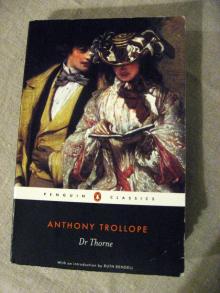 Doctor Thorne
Doctor Thorne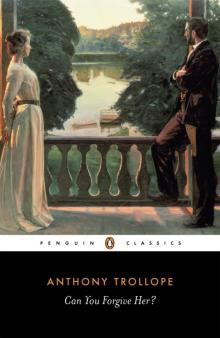 Can You Forgive Her?
Can You Forgive Her?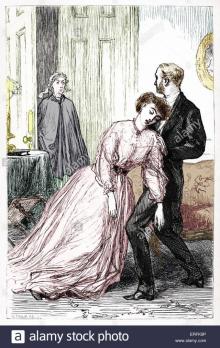 The Last Chronicle of Barset
The Last Chronicle of Barset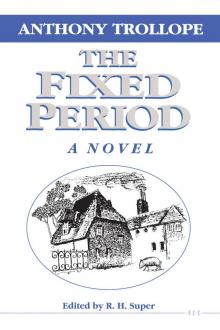 The Fixed Period
The Fixed Period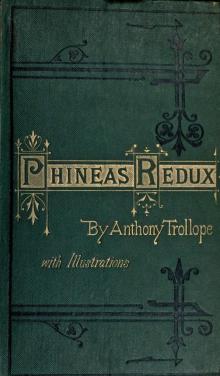 Phineas Redux
Phineas Redux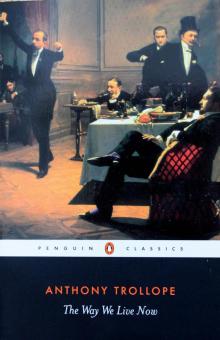 The Way We Live Now
The Way We Live Now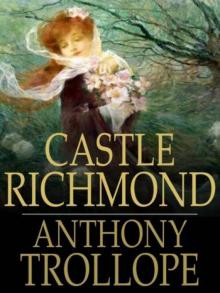 Castle Richmond
Castle Richmond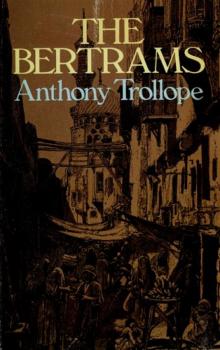 The Bertrams
The Bertrams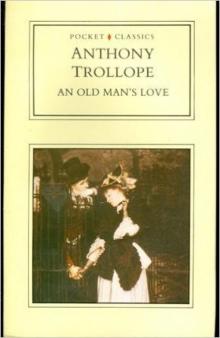 An Old Man's Love
An Old Man's Love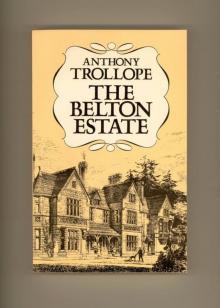 The Belton Estate
The Belton Estate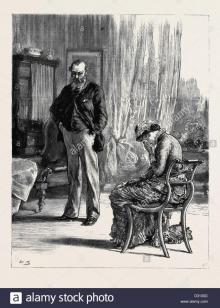 Marion Fay: A Novel
Marion Fay: A Novel The Claverings
The Claverings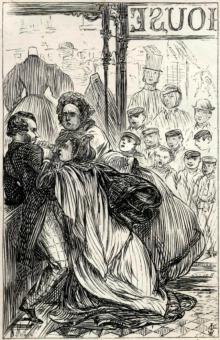 The Struggles of Brown, Jones, and Robinson
The Struggles of Brown, Jones, and Robinson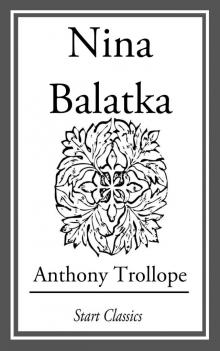 Nina Balatka
Nina Balatka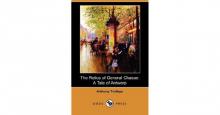 The Relics of General Chasse: A Tale of Antwerp
The Relics of General Chasse: A Tale of Antwerp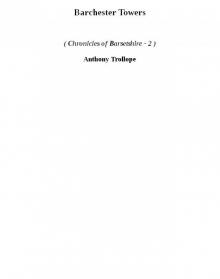 Barchester Towers cob-2
Barchester Towers cob-2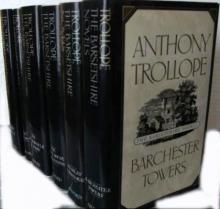 The Chronicles of Barsetshire
The Chronicles of Barsetshire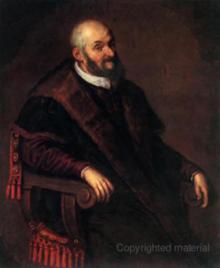 The Warden cob-1
The Warden cob-1 Framley Parsonage
Framley Parsonage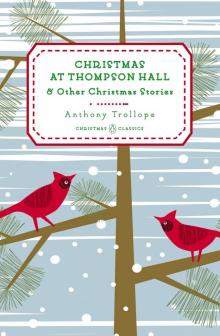 Christmas at Thompson Hall
Christmas at Thompson Hall The Warden
The Warden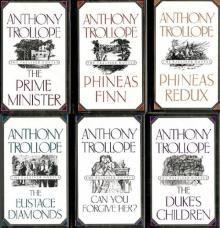 The Palliser Novels
The Palliser Novels The Small House at Allington
The Small House at Allington Barchester Towers
Barchester Towers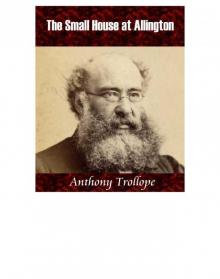 The Small House at Allington cob-5
The Small House at Allington cob-5 The Duke's Children
The Duke's Children Phineas Finn, the Irish Member
Phineas Finn, the Irish Member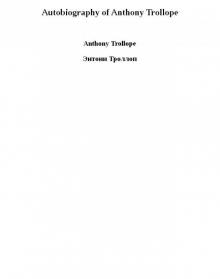 Autobiography of Anthony Trollope
Autobiography of Anthony Trollope